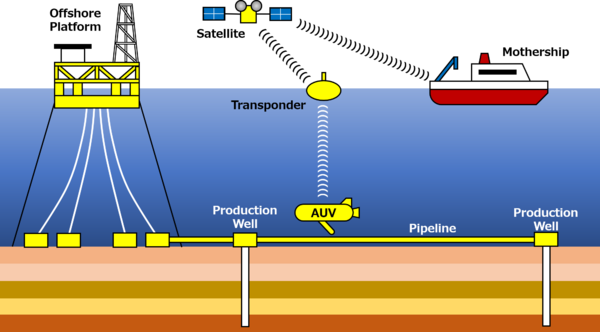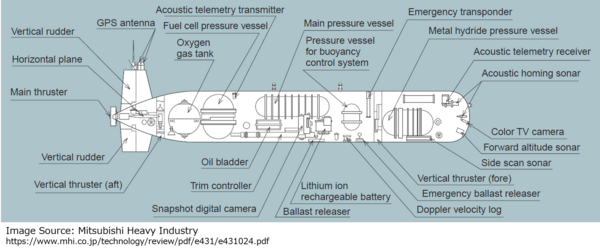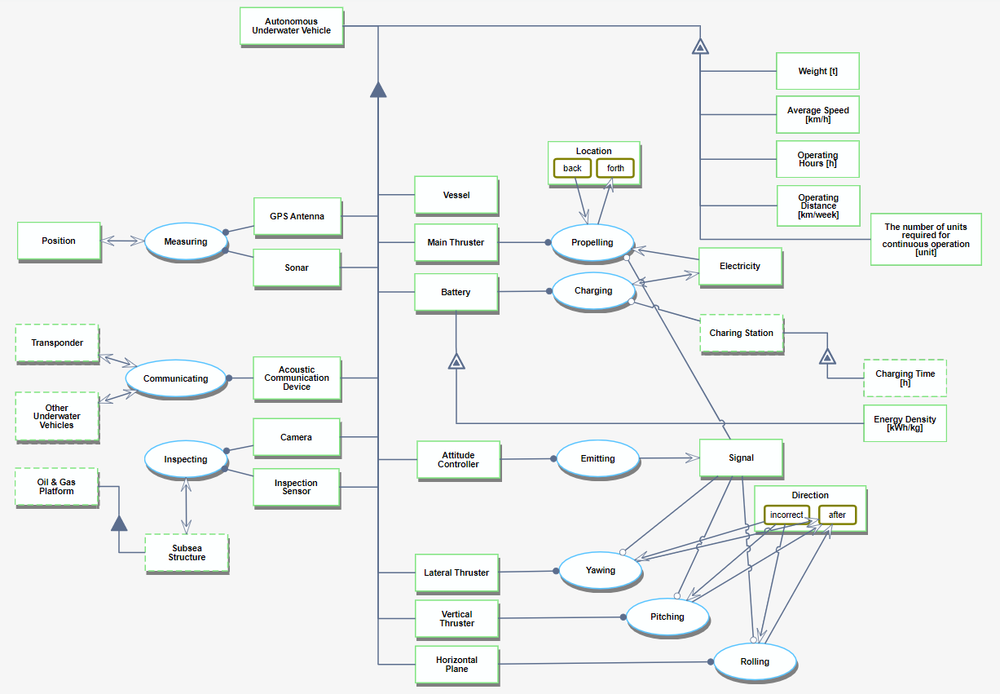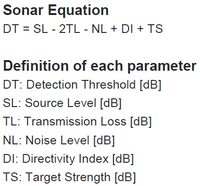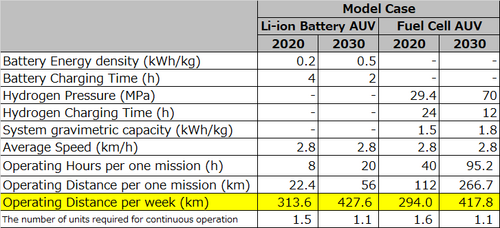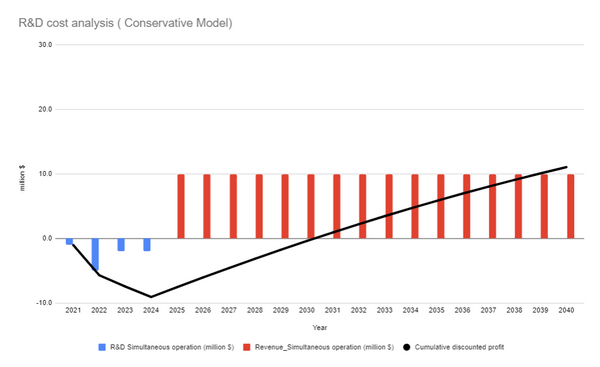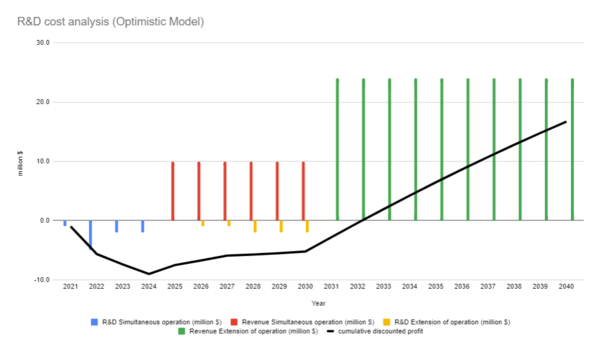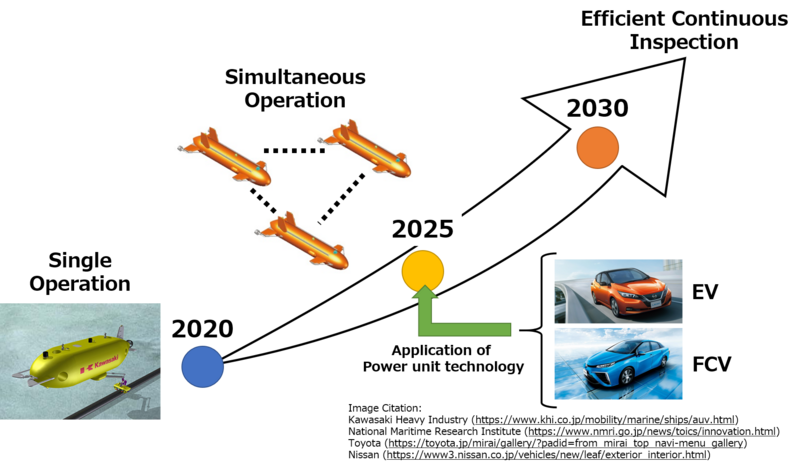Difference between revisions of "Autonomous Underwater Vehicle"
| Line 54: | Line 54: | ||
|- | |- | ||
| 1 ||To develop communication between AUVs by the integration of acoustic multiplexing technology with AUVs by 2025.|| Currently, AUVs for oil and gas platform inspection are in practical use, but they are operating independently. The roadmap of this technology will enable the AUVs to operate simultaneously. | | 1 ||To develop communication between AUVs by the integration of acoustic multiplexing technology with AUVs by 2025.|| Currently, AUVs for oil and gas platform inspection are in practical use, but they are operating independently. The roadmap of this technology will enable the AUVs to operate simultaneously. | ||
|- | |||
| 2 || To develop energy-efficient Acoustic sensors for AUVs. || Energy-efficiency in underwater networks is essential since nodes are mostly battery powered and it is difficult to replenish their supply. The energy-efficient sensors will save the battery and allow longer operating hours for the AUVs | | 2 || To develop energy-efficient Acoustic sensors for AUVs. || Energy-efficiency in underwater networks is essential since nodes are mostly battery powered and it is difficult to replenish their supply. The energy-efficient sensors will save the battery and allow longer operating hours for the AUVs | ||
|- | |- | ||
Revision as of 15:59, 28 November 2020
Technology Roadmap Sections and Deliverables
The unique identifier of this technology roadmap is:
- 2AUVOPI - Autonomous Underwater Vehicle for Offshore Platform Inspection
This indicates that we are dealing with a “level 2” roadmap at the product or system level, where “level 1” would indicate a market level roadmap and “level 3” or “level 4” would indicate an individual technology roadmap.
Roadmap Overview
The offshore platforms are the oil and gas production facilities that are located offshore. In the past, oil and gas were generally produced on the ground. However, as the number of fossil fuel-rich sites that were accessible from the ground has been limited, offshore oil and gas development has been important. In 2016, there were more than 3,000 offshore oil and gas production facilities in the world, and it is estimated that the number of facilities will increase.<ref>International Energy Agency (IEA), Offshore Energy Outlook (2018), https://webstore.iea.org/download/direct/1034</ref>
The offshore platform has a lot of subsea structures such as pipelines, so the inspection and maintenance of these structures is a very important issue. However, some platforms are installed in water depths of more than hundreds of meters, so it is impossible for humans to dive and inspect these structures. In order to overcome this problem, Remotely Operated Vehicles (ROVs) are widely used. ROVs are unmanned vehicles that are connected to the mothership by a wire and can be manipulated by operators who are boarding in the mothership. In addition, ROVs can get power through the wire, so they can be operated for a long time. However, ROVs have many problems such as motion limitation caused by the wire. On the other hand, the Autonomous Underwater Vehicles (AUVs) don't have wires, so the operation flexibility is the great advantage of AUVs.
The overview of the AUVs operation in the offshore platform is as below. The AUVs inspect the subsea structures such as pipelines automatically and they can communicate with the operators in the mothership through the transponders and satellites.
The general arrangement of AUV's mechanical components is as below. Typical AUVs look like a submarine, and they have thrusters and power sources that are necessary to move in the water. In the water, the amount of air that can be used for the combustion of fuel is very few, so a battery or fuel cell is generally used as a power source of AUV. In addition, there are some sensors and communication systems such as sonar, camera, and acoustic system, and they are very important to move underwater automatically and inspect the subsea structures.
Design Structure Matrix (DSM) Allocation

The above 2AUVOPI tree shows the relationship between some systems related to the AUV that uses the battery as a power source. This tree says that the AUV for offshore platform inspection (2AUVOPI) is one of the methods of the offshore platform inspection and consists of the vessel (3VES), thruster (3THR), power source (3POW), position sensing device (3PSD), communication device (3COD), and inspection device (3IND) subsystems. These subsystems require following components: composite (4COM), screw (4SCR), electric motor (4EMO), battery (4BAT), GPS antenna (4GPS), sonar (4SON), acoustic communication device (4ACD), camera (4CAM), inspection sensor (4INS).
Roadmap Model using OPM
We provide an Object-Process-Diagram (OPD) of the 2AUVOPI roadmap as below. As this diagram shows, the object of this roadmap (AUV) consists of subsystems such as thrusters, battery, controller, sonar, and sensor. These subsystems are organized for the movement in the water, the inspection of subsea structures, and the communication with other underwater vehicles. In addition, some indicators that characterize the performance of AUV are also shown in this diagram, and these indicators are some of the Figure of Merit (FOM).
An Object-Process-Language (OPL) description that is generated automatically is as below. The content of this OPL is the same as the above OPD.
Figures of Merit (FOMs)
The table below shows a list of FOMs by which autonomous underwater vehicle can be assessed.
| FOM name | Units | Description |
|---|---|---|
| Operating Distance | km | Distance that can be traveled in an operation |
| Speed | km/h | Cruising speed in the water |
| Payload | kg | Useful payload that can be carried |
| Diving Depth | m | Depth that can be reached |
| Endurance | h | Hours that can be operated |
Alignment with Company Strategic Drivers
| Number | Strategic Objective | Alignment and Targets |
|---|---|---|
| 1 | To develop communication between AUVs by the integration of acoustic multiplexing technology with AUVs by 2025. | Currently, AUVs for oil and gas platform inspection are in practical use, but they are operating independently. The roadmap of this technology will enable the AUVs to operate simultaneously. |
| 2 | To develop energy-efficient Acoustic sensors for AUVs. | Energy-efficiency in underwater networks is essential since nodes are mostly battery powered and it is difficult to replenish their supply. The energy-efficient sensors will save the battery and allow longer operating hours for the AUVs |
| 3 | To improve the performance of the lithium-ion battery of AUVs by 2030. Improving the performance of the battery includes improving its Cycle Life, Depth of Discharge, Usable Capacity, etc | A high-performance battery will increase the operation time as well as the operation distance of the AUVs. These technologies require a lot of resources, fortunately, the technology is progressing in the automobile field, so the same research can be used in the AUVs also. |
Positioning of Company vs. Competition
source: https://www.mdpi.com/2076-3417/10/4/1256/pdf
Technical Model
Among many technical components of AUV, the sensor and power source are the example of key components of the AUV for offshore platform inspection, so we featured the related technical models.
Sensor
The key FOM of sonar is the “Detection Threshold (DT)”, and the technical equation of DT is as below.
Below is the normalized tornado chart that shows the sensitivity of each parameter to DT.
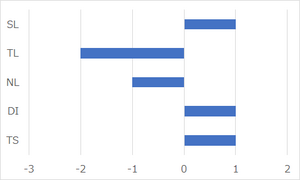
As this chart shows, TL is the most sensitive parameter. However, it is impossible to change TL and NL because these parameters are determined by the composition and depth of seawater. In addition, TS depends on the character of the inspection target, so we can’t also change this parameter. If we increase SL, DT will be improved, but it needs more energy in order to increase SL. This method may not be effective for AUV because the energy capacity of AUV is limited. On the other hand, DI can be improved by changing the directivity of the receiver, and this improvement would have minimal impact on other components of AUV, so this approach may be effective to improve DT.
Power Source
One of the expected power sources of AUV is a fuel cell. If we want to increase the energy capacity of a fuel cell, it is necessary to increase the amount of hydrogen storage. However, the space capacity of AUV is limited, so increasing the pressure of the stored hydrogen, rather than making the dimension of the hydrogen tank larger, would be effective. The relationship between the hydrogen pressure and the tank dimension is below.
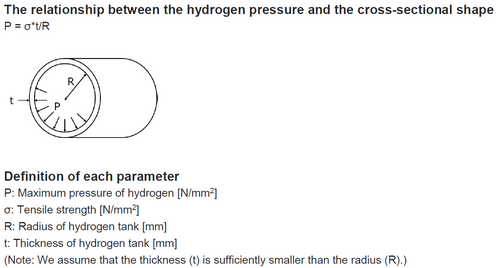
If we can’t change the overall dimension of the hydrogen tank because of the AUV's size limitation, the variables that can be changed are “σ” and “t” in order to increase the hydrogen capacity. Below is the normalized tornado chart that shows the sensitivity of “σ” and “t” to the maximum hydrogen pressure.
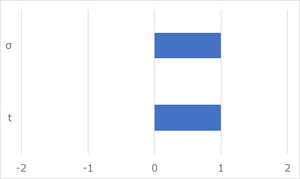
As this chart shows, “σ” and “t” have the same sensitivity for maximum hydrogen pressure. However, if we increase “t”, this directly leads to increasing the hydrogen tank weight. In order to avoid weight increase, it is effective to increase“σ”by changing the material of the hydrogen tank.
Key Publications and Patents
In the inspection of Oil & Gas offshore platforms, AUV moves slowly near the facilities such as pipelines on the seabed, and AUV checks the facilities by using nondestructive inspection methods. The key factors of inspection AUVs are "navigation”, “energy supply", "safety”, and “inspection method", so we select the related key publication and patent as below.
Publications
- Yoshiki Sato, Toshihiro Maki, Kotohiro Masuda, Takumi Matsuda, and Takashi Sakamaki, "Autonomous Docking of Hovering Type AUV to Seafloor Charging Station based on acoustic and visual sensing", IEEE Underwater Technology, 2017
Executive Summary: This report is about the automatic navigation and docking technology that use the acoustic signal and visible LED light. In addition, the author also reports the result of wireless charging to AUVs during docking.
Patents
- Byrd, et al. (2019) "Underwater vehicle for inspection of a subsea structure in a body of water and related method", United States Patent 10370074
Executive Summary: The invented AUV has a body like a torpedo and this AUV can sail safely at a certain distance from the pipelines. In addition, this AUV has 2 sensors on the upper and lower side of its body, and these sensors enable us to detect problems such as corrosion in the pipelines nondestructively.
List of R&D Projects
Summary
Our goal is the establishment of an AUV system for continuous inspection of oil and gas offshore platforms. This will be able to contribute to providing efficient inspections and making platforms safe.
However, because the energy capacity of each AUV is limited, it is necessary to put the multiple AUVs into the mission by turns.
In order to achieve a seamless inspection, it is important to communicate between each AUV and take over the mission smoothly, so the establishment of communication technology between AUVs is an important R&T topic.
In addition, the longer the hours an AUV can operate per one mission, the more cost-effective it becomes because we can reduce the number of AUVs that are necessary to be deployed for replacement.
Therefore, we think that the extension of AUV's operating hours is also an important R&T issue.
Communication technology between AUVs
Currently, AUVs for oil and gas platform inspection are in practical use, but they are operating independently.<ref>Kawasaki Heavy Industries, Autonomous Underwater Vehicle (AUV) “SPICE”, http://www.khisubsea.co.uk/autonomous-underwater-vehicle/</ref>
If we want to operate several AUVs simultaneously, acoustic multiplexing technology is necessary as a communication method, and this technology has recently been matured.<ref>JAMSTEC, Next-generation technology for ocean resources exploration, https://www.jamstec.go.jp/sip/en/pdf/brochure.pdf</ref>
Based on this situation, our first goal is the integration of acoustic multiplexing technology with AUVs for oil and gas platform inspection.
We plan to take five years for this challenge.
Extension of AUV's operating hours
The extension of AUV's operating hours will be achieved by the development of battery technology or fuel cell technology.
These technologies require a lot of resources, so it is difficult to build everything up from scratch. Fortunately, the technology competition between battery and fuel cell has been progressing in the automobile field, so we will be able to apply the result of R&T of the automotive.
In our analysis, we think that both Li-ion battery and fuel cell are promising energy source for AUV at present.
Based on the battery-powered and fuel-cell-powered AUVs that were built so far, we made model cases in 2020 and 2030 as follows.
<ref>Kawasaki Heavy Industries, https://www.khi.co.jp/stories/articles/vol99/</ref>
<ref>Toshio Maeda et al, Fuel Cell AUV "URASHIMA", Mitsubishi Heavy Industries, Ltd. Technical Review Vol.43 No.1(Jan.2006), https://www.mhi.co.jp/technology/review/pdf/e431/e431024.pdf</ref>
<ref>NEDO, Rechargeable Battery Technology Development Roadmap 2013, https://www.nedo.go.jp/content/100535728.pdf</ref>
<ref>Reinhardt Wagner, Battery Fuel Gauges: Accurately Measuring Charge Level (2006)</ref>
<ref>DOE, Target Explanation Document: Onboard Hydrogen Storage for Light-Duty Fuel Cell Vehicles (2017), https://www.energy.gov/sites/prod/files/2017/05/f34/fcto_targets_onboard_hydro_storage_explanation.pdf</ref>
At present, the performance of battery and fuel cell are in competition (Battery (313.6(km/week)) VS Fuel Cell (294.0(km/week))). In addition, the performance improvement expected in 2030 is also in competition (Battery (427.6(km/week)) VS Fuel Cell (417.8(km/week))). Therefore, we think that narrowing down power unit candidates to either battery or fuel cell is not a good idea at this time.
However, these predictions are just model cases, so the situation may change significantly depending on future technological developments.
Therefore, we plan to keep following up on the development trends of power unit until 2025, decide which technology is suitable for our AUV in 2025, and install the power unit in 2030.
R&T schedule
The overall R&T schedule is as below. We set a stage-gate in 2025 and are going to decide whether we should expand our project or not.

Financial Model
Based on the above R&T schedule, we analyzed the financial feasibility of our project.
Our strategy has two stages. In the first stage, we conduct R&T of acoustic communication technology and start selling AUVs with this technology in 2025.
In the second stage, we conduct R&T of battery or fuel cell technology and start selling AUVs with new power units in 2031.
Based on the evaluation results about the power unit scheduled in 2025, we will be able to choose between the following two models.
1) Conservative model: We don't invest in the R&T of the power unit, and we continue to sell only AUVs with acoustic communication technology. In this case, the operation hours of this AUV remain short, so the unit price will be low and the number of sales will be small (1 million$/unit, 10 unit/year) because of the low competitiveness.
2) Optimistic model: We decide to invest in the R&T of the power unit, and we will start to sell the AUVs with new power units in 2031. In this case, the operation hours of this new AUV will be long, so the unit price and the number of sales will increase (1.2 million$/unit, 20 unit/year) based on the high competitiveness.
Based on the similar projects of AUV's communication technology, we estimated that the R&T cost of acoustic communication technology is 10 million $. This cost covers the design, 2 prototype AUVs production, field test, and improvement. The manufacturing cost of 2 prototype AUVs will be the most expensive (5 million $). In addition, we estimated that the R&T cost of the power unit is 8 million $. We plan to divert the prototype AUVs for acoustic communication technology to the R&T of the power unit, and this will lead to cost-saving of R&T. In both models, we expect a learning effect on productivity. We assume that the initial profit margin is 20%, and the profit margin improves by 1% each year. Furthermore, we assume that the discount rate is 7% that is general in the R&D project, and calculate the Net Present Value (NPV) by 2040. Based on these assumptions, we analyzed the financial forecast as follows.
Financial forecast of conservative model
Financial forecast of optimistic model
As these results show, even if we choose the conservative model, the NPV is positive (11.1 million $). This means that the conservative model is profitable. However, the optimistic model is more profitable (NPV: 16.7 million $), so it can be mentioned that the stage-gate related to the power unit scheduled in 2025 is very important for our project because this will determine whether we can maximize profits or not.
Technology Strategy Statement
As we mentioned above, our goal is the establishment of an AUV system for efficient continuous inspection of oil and gas offshore platforms in 2030. In order to achieve this goal, we will invest in two R&T projects. The first is the integration of acoustic multiplexing technology with AUVs, and we plan to succeed in the coordinated simultaneous operation of multiple AUVs until 2025. The second project is the extension of AUV's operating hours. Our strategy is to apply the technology of the automobile industry to AUVs, so we plan to assess the development trends of the automobile power unit in 2025 and integrate the selected technology into the AUVs in 2030. This will enable us to maximize the operating hours and minimize the number of AUVs which are necessary to the continuous inspection mission.
References
<references />
